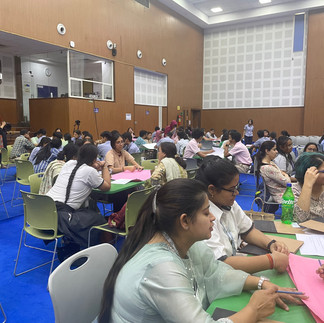
The Idea of Justice: Chapter 4 brought together 55 teachers and 135 students under one roof to reflect on justice in its multiple manifestations in our personal, social, and political lives. The participants were from schools all over Delhi and beyond and brought their unique perspectives and life experiences to the workshops. The talks broached difficult questions to the participants—what is the difference between equity and equality? How do social disadvantages like caste influence our perception of justice? How does one address one’s own privilege and make a difference? How involved is our youth in the burning question of environmental justice? The workshops attempted to deal with these questions through tools such as theatre and literature and pushed participants to reflect on justice in school and at home.
Swarna Rajagopalan, political scientist and peace worker, opened the conference with a conversation on the importance of making a difference through our everyday actions. She suggested that each and every one of us, despite our limited capacities, can change the life of an underprivileged person. Personal experiences furnished from her family history demonstrated that one doesn’t need anything, beyond will and intent, to extend support for someone who is the victim of systemic inequities. It is very easy to inhabit the status quo and feel helpless about the problems of the world. But she asserted, through example and life experience, that it is possible to transform that helplessness into a call for action. Nivedita Menon, professor and feminist activist, explored how our very concept of justice is coded by privilege and asserted the importance of dismantling that. Whether it is gender justice or anti-caste struggle, she questioned our fundamental ideas of right and wrong and urged us to reconsider our vision of equality. From our bubbles of privilege, how often do we find ourselves raging against caste-based reservations or other forms of affirmative action? How do we respond to inconvenient truths about our own position in society? These questions led organically to Bittu Sahgal’s talk titled ‘The Crisis Looming Large’ which broached the issue of environmental justice. He shared the story of how he came upon the realization that he wanted to dedicate his whole life to the cause and discussed some practical ways in which people can participate in environmental activism. Sundar Sarukkai reflected on how philosophical notions of justice could be translated to everyday action.
Every talk was followed by an extensive Q & A session where students directly engaged with the speakers. They showed a keen enthusiasm to discuss sensitive issues of discrimination and raised questions on the ethics of caste-based reservations, how to battle everyday forms of gender discrimination, among others. The questions demonstrated the interest and enthusiasm of students to think about such issues and established the crucial importance of initiatives like this conference.
The workshops built on the questions raised by the talks and attempted to further nuance how various concepts of justice can be applied to everyday life. Barry Van Driel prompted teachers to identify injustices in their own social and political lives and through argumentative activities, pushed them to articulate their own understanding of justice.
Neha Pradhan and Kaveri explored how a teacher’s daily life is fraught with impossibilities both within the classroom and beyond. Burdened to the point of exhaustion by regular school work, questions of justice might recede into the background. How does the teacher remain inspired to broach difficult questions in the classroom battling the limitations of the curriculum? The workshop was an avenue to form a community and enable the sharing of experiences to create solidarities that might help teachers deal with such struggles. Ranita Ray used fiction to discuss what qualified as just and the imaginations of a just society through questions such as: Is it easier to recognize the violation or absence of justice rather than its presence? Is justice a necessary fantasy? Is our sense of justice innate or social? Komita Dhanda brought theatre to explore the concept of justice and its complexities. Through basic theatre exercises, she engaged with the idea of equality and analyzed different perspectives on justice. Angana Das and Amreeta Das explored various kinds of justice—social, political, and constitutional through activities that pushed students to think of examples from their own lives where they might have identified an injustice. Students were presented with ethical dilemmas where they had to take a stance based on their conception of justice and defend it. Through activities such as these, the workshop exposed contradictions in their understanding of justice and provoked difficult conversations on issues such as caste-based reservations, working class resistance movements, the role of the silent bystander in the face of injustice, the role of the law courts and the difficulty of accessing legal justice for the marginalized, among others.
The participants came together for a world café where students and teachers shared their reflections on the workshops and grappled with some of the big questions that emerged from the conference.



















Comments